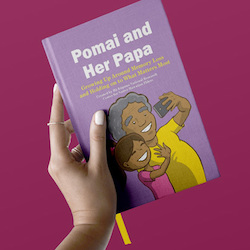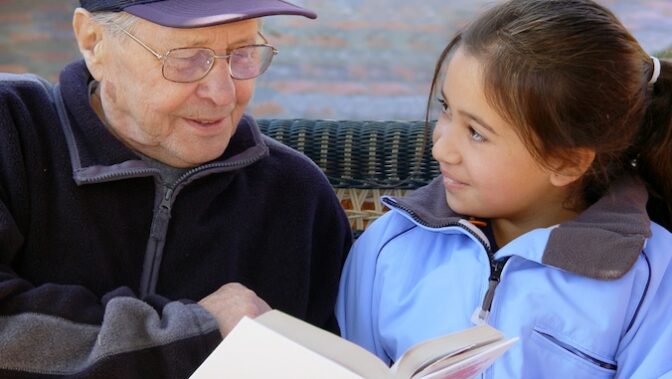By Staff Reports
(Hawaii)– Currently, nearly 100,000 kūpuna and others in Hawaiʻi are impacted by Alzheimer’s disease or another form of dementia. In Hawaiʻi, where multigenerational homes are common, many young people are living with older adults with Alzheimer’s disease and other dementias. Yet, youth caregivers are largely invisible to the eldercare service system.

To shine light on this issue, a storybook for Hawaiʻi youth, titled Pomai and her Papa, developed by University of Hawaiʻi at Mānoa public health and social work researchers, has been distributed to all 294 Hawaiʻi Department of Education public and charter schools, and all 51 public libraries statewide. Books were provided free of charge, and included a short guide for young people and one for supportive adults.
Developed by the Hā Kūpuna, the National Resource Center for Native Hawaiian Elders, a program of the Thompson School of Social Work & Public Health, the storybook follows Pomai as she navigates troubling changes she begins to notice in her Papa. She starts to struggle in school because she is unsure how to help him.
“This book mirrors the lives of our students,” says Joyce Pien, library literacy teacher at Pālolo Elementary School. “It validates their life experiences as grandchildren who cherish their aging grandparents.”
The book was based on research conducted by the Hā Kūpuna team through which they interviewed youth, physicians, eldercare providers and cultural advisors.
Mnemonics help retain information
“The data suggested that youth liked stories, especially those that reflected the faces and voices of Hawaiʻi,” said Shelley Muneoka, coordinator of Hā Kūpuna. “We also learned that mnemonics can help youth recall larger pieces of information.”
Thus, the mnemonic HALIʻA (fond remembrance), developed by Lana Sue Kaʻopua, appears throughout the book that outlines symptoms of Alzheimer’s disease and other forms of dementia:
H: Hard to remember names, events, basic information. May lose track of days, dates, time of year. Hard time finding things.
A: At risk of wandering and other unsafe behaviors.
L: Loses judgment, has harder time problem-solving.
I: Increasing difficulty in remembering words when speaking or writing.
ʻA ʻAno (a person’s basic nature, personality) changes. With these changes can come confusion, frustration, anger and impatience that can be seen in facial expressions, voice, gestures and behaviors.
“The story book also provides links for more information about dementia,” said Kathryn L. Braun, director of Hā Kūpuna and professor in the Office of Public Health Studies. “It also includes ways to connect to the Alzheimer’s Association-Aloha Chapter.”
Download Pomai and Her Papa for free. A full report of the research upon which the book is based is published in Gerontology and Geriatrics Education.
Braun and Muneoka’s co-authors on the paper also included: Colette V. Brown, Lana Sue Kaʻopua, Yan Yan Wu, Rachel L. Burrage and Yeonjung Lee from Hā Kūpuna National Resource Center for Native Hawaiian Elders.

